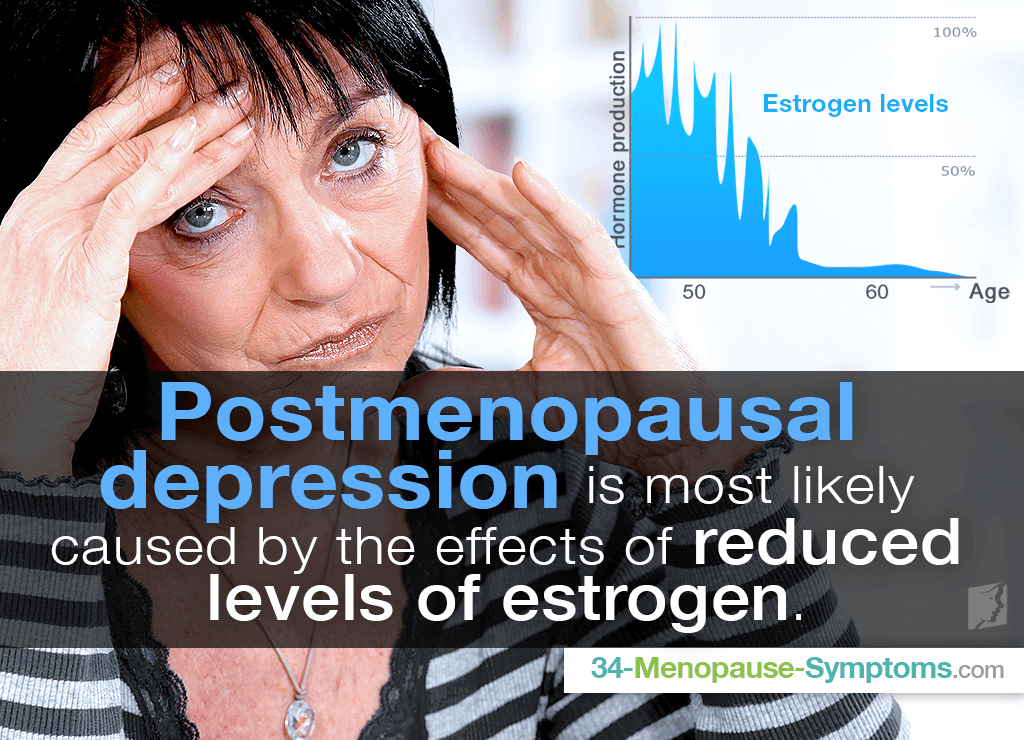For many women, depression can continue past menopause or arise for the first time, even after other menopause symptoms have disappeared. Therefore, being informed about the changes that have taken place in your body can be extremely helpful in understanding depression after the menopausal transition.
Continue reading to learn more information about depression after menopause, including what it is and what causes it, treatment options, and more, so that you can sail into your twilight years on a happy note.
Postmenopausal Depression: What It Is and Causes
Depression is characterized by feelings of sadness or anxiety for long spans of time, and it can lead to a variety of physical ailments along with thoughts of suicide. Depression needs to be seen as a disease caused by both environmental and physiological factors.
Depression after the menopausal transition is most likely caused by the effects of reduced levels of estrogen. This crucial reproductive hormone influences the action of certain neurotransmitters, such as serotonin, which is responsible for regulating mood.
In addition, menopause often coincides with other factors in a woman's life, such as changing life events and the realization that she is no longer able to conceive.
Studies Prove Depression after Menopause Is More Common
Researchers from the University of Pittsburgh performed an analysis on 221 women enrolled in the ongoing prospective Study of Women's Health Across the Nation. When the women originally entered the study, they were between the ages of 42 and 52, premenopausal, and taking neither hormone replacement therapy nor birth control pills.
Over the course of the study, more than half of the women went through menopause and about a third experienced at least one major depressive episode. It is important to keep in mind that those who had a history of major depression were more likely to have such an episode.
Based on this analysis, the authors of the study concluded that the risk for major depression is doubled as women go through the menopausal transition.
How to Deal with Depression after Menopause
Self-Care
There are many depression treatments women can pursue to improve their mental health before the onset of depression after the menopausal transition menopause.
Because many menopausal symptoms are rooted in hormonal imbalance, stabilizing moods will focus on hormonal equilibrium for women passing through the menopausal transition.
For starters, implement simple lifestyle changes of regular exercise - for improved physical and psychological benefits - and an optimized diet rich in phytoestrogens, probiotics, and foods known to promote healthy serotonin levels, such as complex carbohydrates and those rich in folic acid.
For improved results, consider the use of alternative medicine, such as phytoestrogenic herbal supplements or hormone-regulating supplements.
It is important to note that depression caused by a psychological disorder should be treated in the first instance by a medically certified practitioner.
Helping a Loved One with Depression after Menopause
Just as there are self-help tips, the following advice can be of use when a loved one is suffering from postmenopausal depression:
- Try to be patient.
- Let her know you care and are there to lend an ear.
- Suggest a qualified therapist. Depression is often best tackled with medication and therapy.
- Be supportive and accept her as she is without judgment.
- Gently encourage her to stay active, eat well, and take part in other self-care measures.
In sum, keep hopes high. With proper initiative taken and a will to find ultimate mood stability, depression after menopause does not have to mean cloudy days for years to come.
Sources
- Bromberger, J.T. et al. (2011). Mood and menopause: findings from the Study of Women's Health Across the Nation (SWAN) over 10 years. Psychological Medicine, 41(9), 1879-1888. doi: 10.1017/S003329171100016X
- NHS. (2016). How to help someone with depression. Retrieved November 22, 2018, from https://www.nhs.uk/conditions/stress-anxiety-depression/signs-someone-is-depressed/




